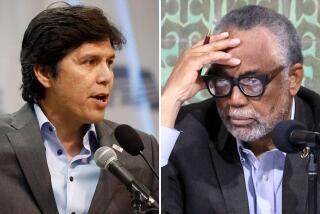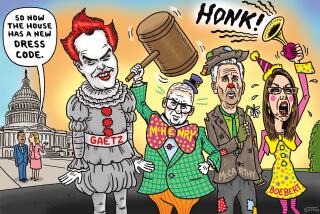Tough Tutors Initiate Panel’s New Chief : Congress: Aides give subcommittee chairman McKeon a rough introduction to running a partisan meeting. The real thing is far tamer.
WASHINGTON — With a bang of his gavel, Republican Rep. Howard P. (Buck) McKeon, a brand-new subcommittee chairman, has just called a meeting to order. But his Democratic colleagues are waging partisan war, attempting to exploit the Southland congressman’s inexperience.
They’re stalling. They’re arguing. They’re introducing amendments left and right aimed at blocking McKeon from advancing his first significant piece of legislation, a complicated consolidation of the nation’s more than 150 job training programs.
“Point of order!” shouts one Democrat. “Parliamentary inquiry!” interrupts another.
They call for a recess, saying they were not properly notified of the meeting. They introduce laughable amendments. They even demand that the clerk read the entire bill aloud.
Luckily for McKeon, this nightmarish meeting unfolding before him is only a drill.
The “Democrats” attempting to rile him are in reality Republican aides. The session McKeon is presiding over is a dress rehearsal arranged by his staff two days before the actual gathering of McKeon’s subcommittee on post-secondary education, training and lifelong learning.
So when the partisan rancor gets especially intense during this practice session, the subcommittee staffers stop the action to give the second-term congressman from Santa Clarita advice.
McKeon, who less than three years ago was a Santa Clarita city councilman, readily admits that he needs the tutoring.
“I didn’t know anything about committees or how legislation worked,” McKeon said of his arrival in Congress in January, 1993. “This is major. There are not too many sophomores who are going to be carrying a bill like this.”
McKeon’s Consolidated and Reformed Education, Employment and Rehabilitation Systems Act of 1995, known as the CAREERS Act, turns a web of 151 education, training and employment assistance programs into four grants to the states, an idea that fits nicely with McKeon’s desire to downsize the federal bureaucracy and bring it closer to home.
*
His days are filled with strategy sessions with the committee staffers drafting the bill’s language, visits by lobbyists eager to leave their mark and meetings with colleagues whose votes will decide whether it passes.
The recent practice session in the Rayburn House Office Building was McKeon’s first experience, though imaginary, in leading a “markup,” which is the critical step in shaping legislation in advance of a vote on the House floor. If the markup job is done well, the bill emerges from subcommittee with bipartisan support and without a host of amendments chipping away at its true intent.
When the real hearing began, McKeon was ready for battle.
He had learned that any member can insist that the clerk read the entire 200-plus-page bill--a delaying tactic that Democrats have used this year during consideration of a welfare reform bill. He had learned that he should summarily discard any amendment that is not directly relevant to job training. And he had learned the importance of pounding the gavel until those attempting to steal control of the meeting pipe down.
But the real Democrats were nowhere near as mischievous when McKeon finally settled into the chairman’s seat, his script laid out before him. They were downright docile.
In the end, McKeon’s bill sailed through subcommittee without objection. He had set aside an entire day for the process; it took 90 minutes.
More to Read
Get the L.A. Times Politics newsletter
Deeply reported insights into legislation, politics and policy from Sacramento, Washington and beyond. In your inbox three times per week.
You may occasionally receive promotional content from the Los Angeles Times.










